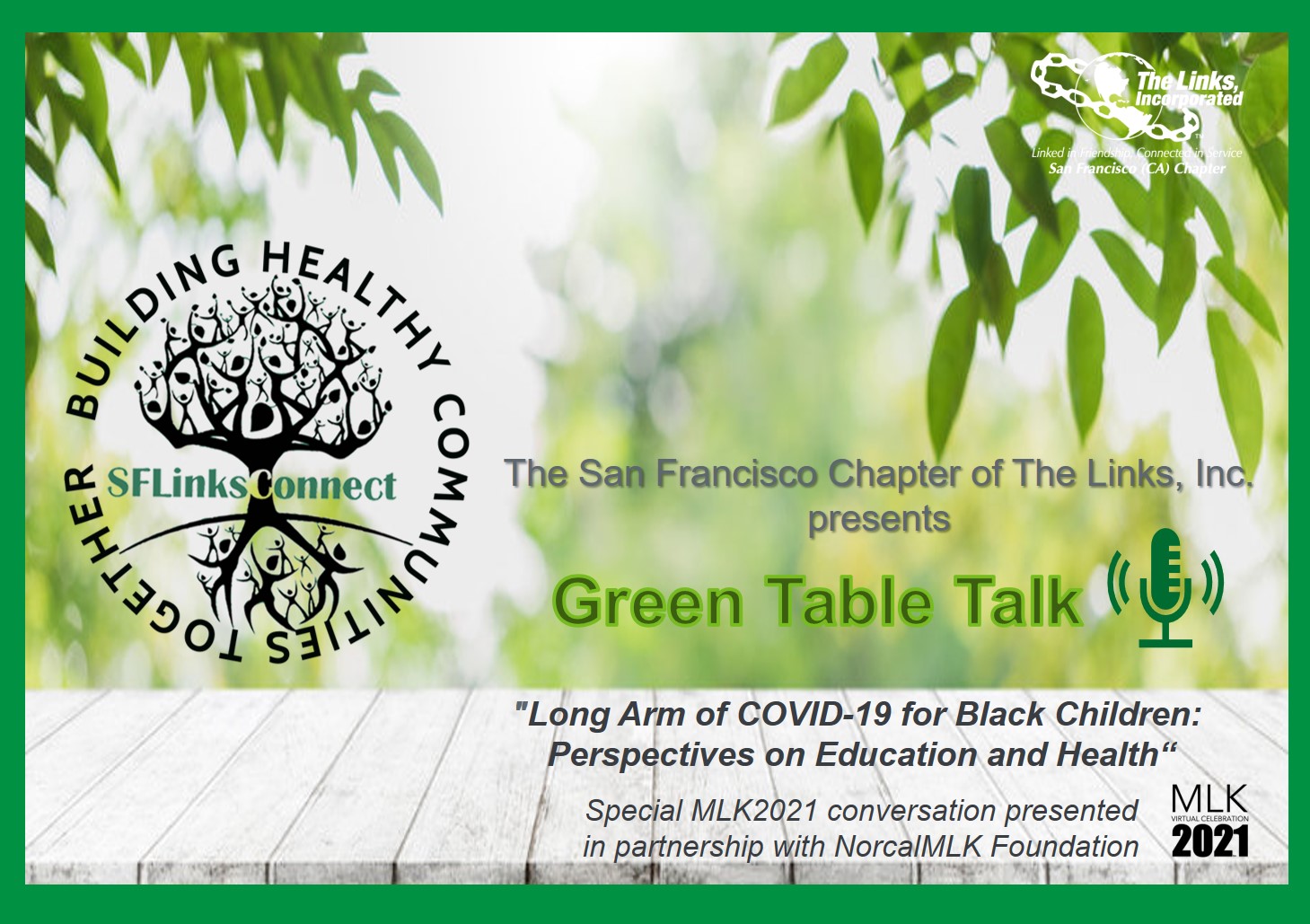have been serving our community since our founding 70 years ago—delivering on the promise and the mission of the Links organization—to enrich and sustain African American communities and people of African ancestry.
As such, the inaugural launch of GREEN TABLE TALK is decidedly a conversation amongst mothers, daughters, sisters, aunts, grandmothers, friends, and other sisterly relationships in representation of our unbreakable bond with one another to lift each other in times of challenge, sustain one another - our families and community, and support our healing. We seek to rebuild, restore, repair, and foster resiliency.
SISTERS IN CONVERSATION
Dean Prudence Carter and Dean Linda Burton (SF Link member), as Deans of the Graduate School of Education and the School of Social Welfare at University of California Berkeley, and as research scientists and scholars who work in the areas of education and health among African American children will speak about the short and long-term impact of COVID-19 on our youth.
Dr. Monique LeSarre, Executive Director for Rafiki Coalition for Health and Wellness, a partner who has delivered programming with us over the last 2 years addressing Adverse Childhood Experiences, also known as ACEs, will join the conversation. She has a specialty in intergenerational trauma and trauma resiliency, and is exceptionally experienced in supporting our targeted service community in Bayview Hunters Point. Dr. LeSarre will round out the conversation with mental health and wellness strategies.
VIEW GREEN TABLE TALK
GUEST BIOS
Linda M. Burton is Dean, Professor, and Eugene and Rose Kleiner Chair for the Study of Processes, of the School of Social Welfare at the University of California, Berkeley. She most recently served as the Director of the Center for Child and Family Policy, Dean of Social Sciences, and Interim Director of the International Comparative Studies Program at Duke University. She is co-editor of The Oxford Handbook of the Social Science of Poverty and Black Boys and Men in African American Families.
\nShe was recently a member of the Committee on the Science of Research on Families for the Institute of Medicine, the Advisory Board of the National Center for Marriage and Family Research, the Board of Directors for the Family Process Institute, and the Board of Directors for the Council on Contemporary Families. In 2013 she was inducted into the Sociological Research Association and served as President of the Association from 2017 to 2018.
She is also a recipient of the Dean’s Excellence Award in Mentoring, Duke University, the Distinguished Career Award for the Family Section of the American Sociological Association, the Alexis Wiley Award for Outstanding Research in Family Science, the Family Research Consortium IV Legacy Award, and the American Family Therapy Academy Award for Innovative Contributions to Family Research.
Dr. Burton directed the ethnographic component of Welfare, Children, and Families: A Three-City Study and is principal investigator of a multi-site team ethnographic study (Family Life Project) of poverty, family processes, and child development in six rural communities. Her research integrates ethnographic and demographic approaches and examines the roles that inequality, poverty, trauma, and intergenerational family dynamics play in the intimate unions of low-income mothers and the accelerated the life course transitions of children, adolescents, and adults in urban and rural families.
PRUDENCE L. CARTER is the E.H. and Mary E. Pardee Professor and Dean of the Graduate School of Education at Berkeley. As a sociologist, her primary research and teaching agenda focuses on causes of and solutions to enduring social and cultural inequalities in schools and education.
Dean Carter’s expertise ranges from issues of youth identity and race, class, and gender, urban poverty, social and cultural inequality, the sociology of education and mixed research methods. Specifically, she examines academic and mobility differences shaped by the effects of race, ethnicity, class, and gender in the United States and global society.
Before being appointed Dean at Berkeley, she was the Jacks Family Professor of Education and Professor of Sociology (by courtesy) at Stanford University. She was also the Faculty Director of John W. Gardner Center for Youth and Their Communities, and the Director of the Research Institute for Comparative Studies in Race and Ethnicity.
A product of public schools in the Mississippi Delta, Dean Carter received a Bachelor of Science degree in applied mathematics and economics from Brown University; earned a Master of Art in Sociology and Education from Teachers College, Columbia University; and a Master of Philosophy and Ph.D. in Sociology from Columbia University.
Dean Carter’s books include the award-winning Keepin’ It Real: School Success beyond Black and White (Oxford University Press, 2005); Stubborn Roots: Race, Culture, and Inequality in U.S. & South African Schools (Oxford University Press, 2012); and Closing the Opportunity Gap: What America Must Do to Give Every Child an Even Chance (Oxford University Press, 2013), co-edited with Dr. Kevin Welner.
Dean Carter is an elected member of the National Academy of Education; the Sociological Research Association; and a Fellow of the American Educational Research Association (AERA). She also serves on the Board of Trustees for the William T. Grant Foundation; and SOAR for Youth (Support, Opportunities, and Rapport).
Monique LeSarre, PsyD, is a proud San Francisco resident, and prides herself on her community work, known as “Dr. Mo” in the community, Dr. LeSarre is Executive Director of Rafiki Coalition, an agency that focuses on reducing Health Disparities and Increasing Wellness in San Francisco's Black community. She also teaches at California Institute of Integral Studies, and gives workshops, trainings, and keynotes locally and Nationally. Dr. LeSarre's teaching is fueled by Cornell West's quote, "Never forget that justice is what love looks like in public." She believes that in order to create individual and community healing, it is most effective to work on multiple levels of the system, beginning with individuals, families, and groups, and on academic, training, research, advocacy and policy levels.

